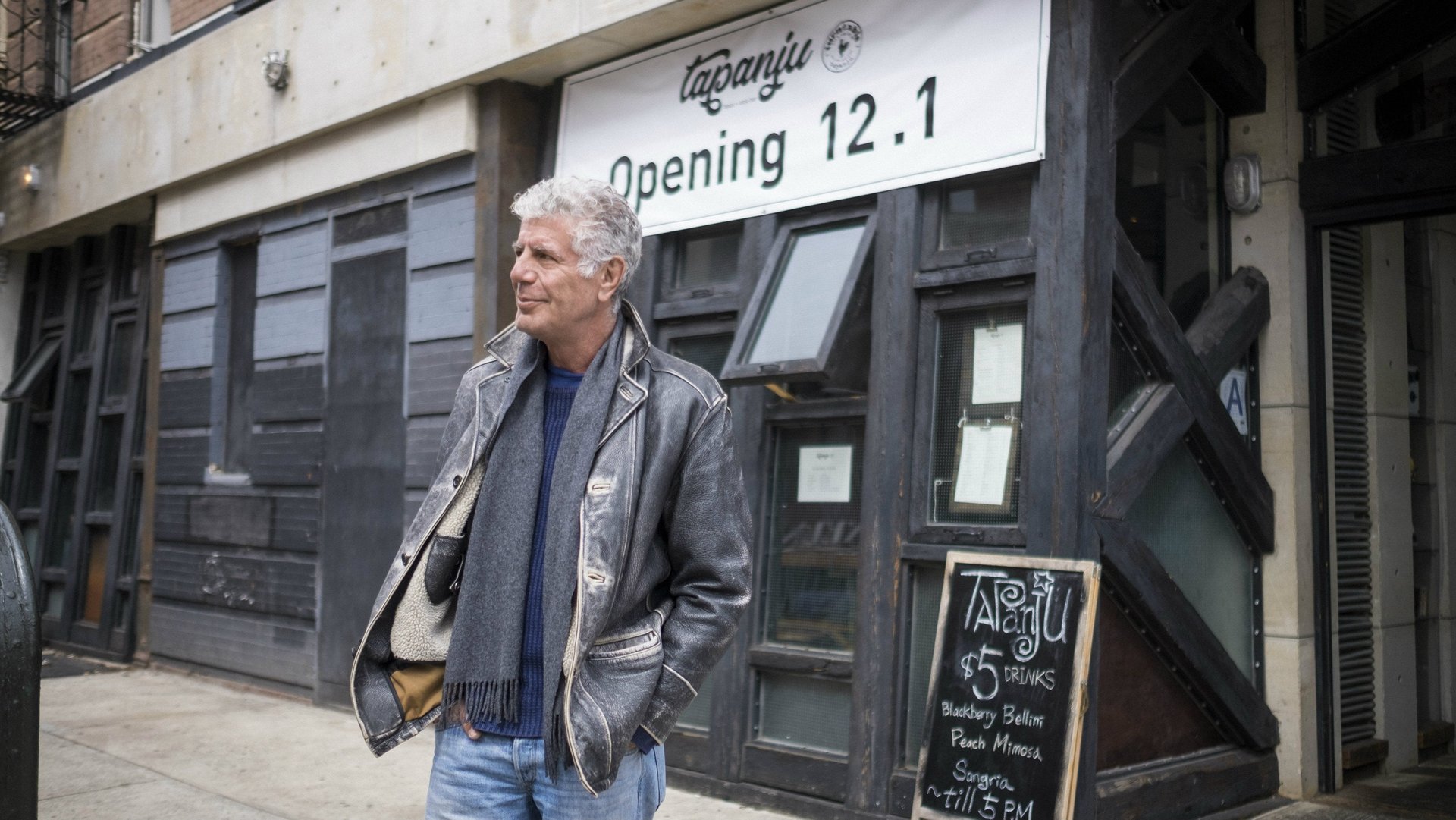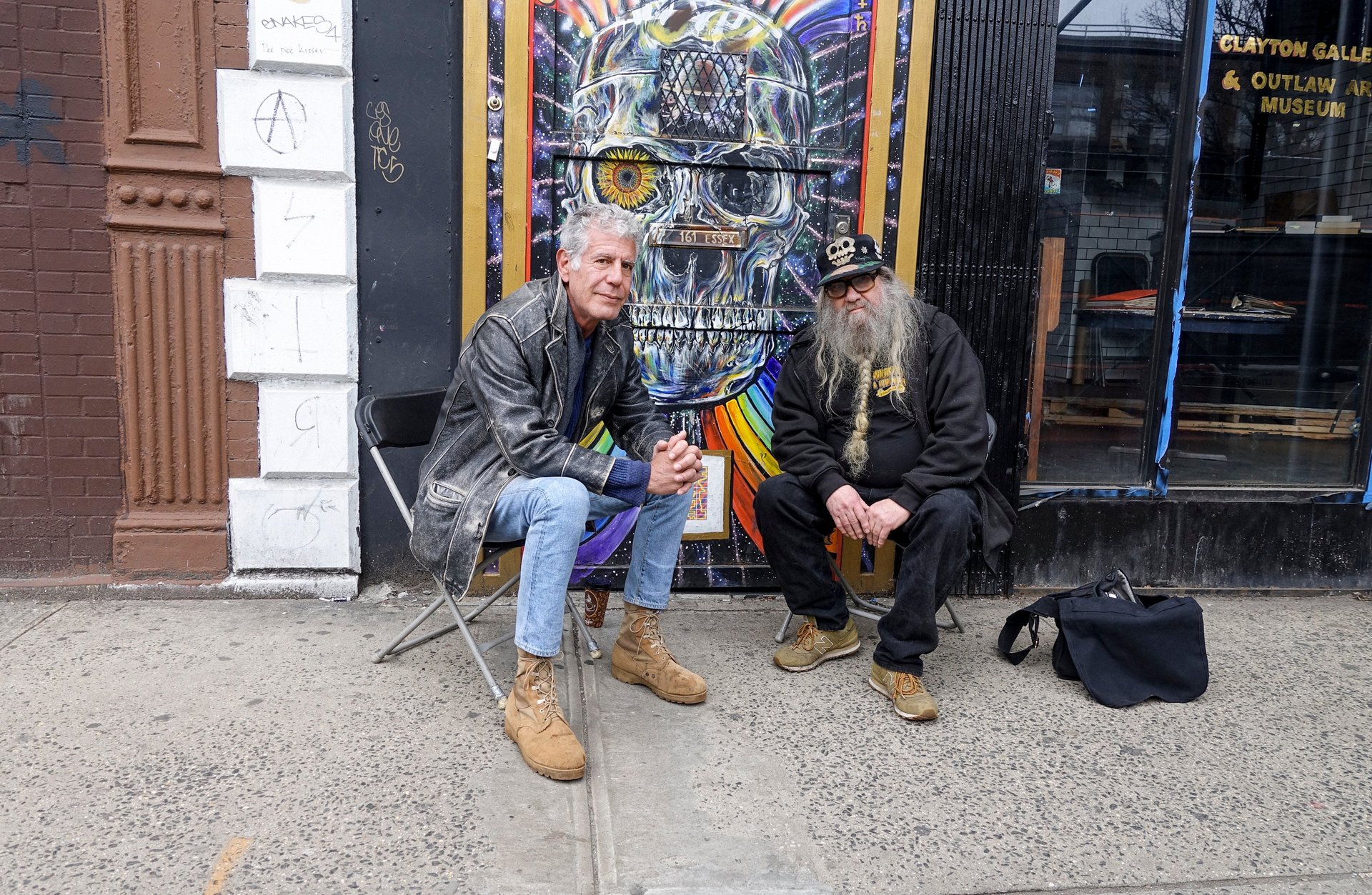Anthony Bourdain’s final episode of “Parts Unknown” is no-bullshit, just like him
Anthony Bourdain was the quintessential New Yorker, and has always been a little punk rock. So it’s fitting that the final episode of Parts Unknown, which will air as a special extended episode this Sunday on CNN, is devoted to Manhattan’s Lower East Side—the “universe … between Houston and 14th Street and Bowery and Avenue C,” as one guest puts it. The episode is a nostalgic dive into the crucible of music, art, discord, reinvention, and poetry that defined the 1970s and 1980s in the LES, as it’s known.


Anthony Bourdain was the quintessential New Yorker, and has always been a little punk rock. So it’s fitting that the final episode of Parts Unknown, which will air as a special extended episode this Sunday on CNN, is devoted to Manhattan’s Lower East Side—the “universe … between Houston and 14th Street and Bowery and Avenue C,” as one guest puts it. The episode is a nostalgic dive into the crucible of music, art, discord, reinvention, and poetry that defined the 1970s and 1980s in the LES, as it’s known.
Bourdain, who died in June and did not complete his work on this season of the show, knew the big wide world better than most of us, but he was born in New York, and his knowledge of this part of the city came before the cameras, the fame, and the readers that adored and envied him in equal parts. It also came before soaring rents and gentrification made Manhattan a wholesome theme park for the rich.
“You know this neighborhood from the dope houses right?” a companion asks in the first few moments of the episode, hinting at Bourdain’s less than savory past. “Yeah all of them,” Bourdain replies. “By order of preference.”
In the episode, Bourdain visits with the surviving bohemians, artists, raconteurs, historians, punks, and multi-hyphenates—from Debbie Harry and Amos Poe to Fab 5 Freddy and Danny Fields—that molded this area over two decades. The wide-ranging conversations serve as a reminder that in the latter years of his career, no one declined an interview with Bourdain. In his final appearance on screen, he does what he always does: He sits down with people and tries to get at something that feels true, even if it’s uncomfortable or not shiny—while eating a stunningly prepared meal or a tinfoil wrapped breakfast sandwich, with a beer to make it go down easier.
Bourdain hated artifice, sanitization, genericness. And in this episode he won’t let you forget that, before the bougie restaurants, Postmates delivery guys, and yoga studios, the LES had a different texture, smell, and feel. It was a place where “cheap rent brought a lot of people together,” as he put it. He also doesn’t shy away from the uglier aspects of this history—AIDs, the heroin epidemic, and the homelessness crisis.

Indeed, central to the episode is the idea of New York City as a place constantly in flux. As one film director notes in the episode, Lower Manhattan used to be a Native American trading post—now it’s Wall Street.
Bourdain seems gently intent on getting to the bottom of whether or not the LES’s explosion of creativity and troublemaking 1970s and 1980s was something special, or whether he’s afflicted with the sentimental nostalgia that comes when one forgets what it feels like to live hand-to-mouth. He gets several different answers to this question, but when the historian and photographer Clayton Patterson says the decades of gentrification mean there’s no going back, no way to reinvent or wrest the city back from half empty high rises, Bourdain sounds resigned. “It’s over.”
Of course, like the prior episodes in this final season—which, with the exception of the season premiere in Kenya, are devoid of Bourdain’s narration, which he he had not finished at the time of his death—the episode feels haunted by its star’s absence. The voice that told you what was what, who was who, and why you should care is replaced by frenetically-styled transitions, and on-screen text introducing the next interviewee or luminary. The absence of Bourdain’s voice as an anchor feels like a loss throughout, and the disorientation it brings feels like delayed reaction to his death—a reminder that the world we live in is one that Bourdain chose to leave.
In its 12-season run, Parts Unknown was always much less about food than Bourdain’s previous shows. But in this final episode, that feels especially true. The last thing we see Bourdain eat on camera is a couple hard boiled eggs, made in the modest kitchen of the artist and musician John Lurie, who admits he doesn’t think he has ever cooked for anyone before. There’s no salt, pepper, or silverware, no buttery sourdough toast to go with it. Just a plate and two eggs. As Bourdain says: “The perfect food.”